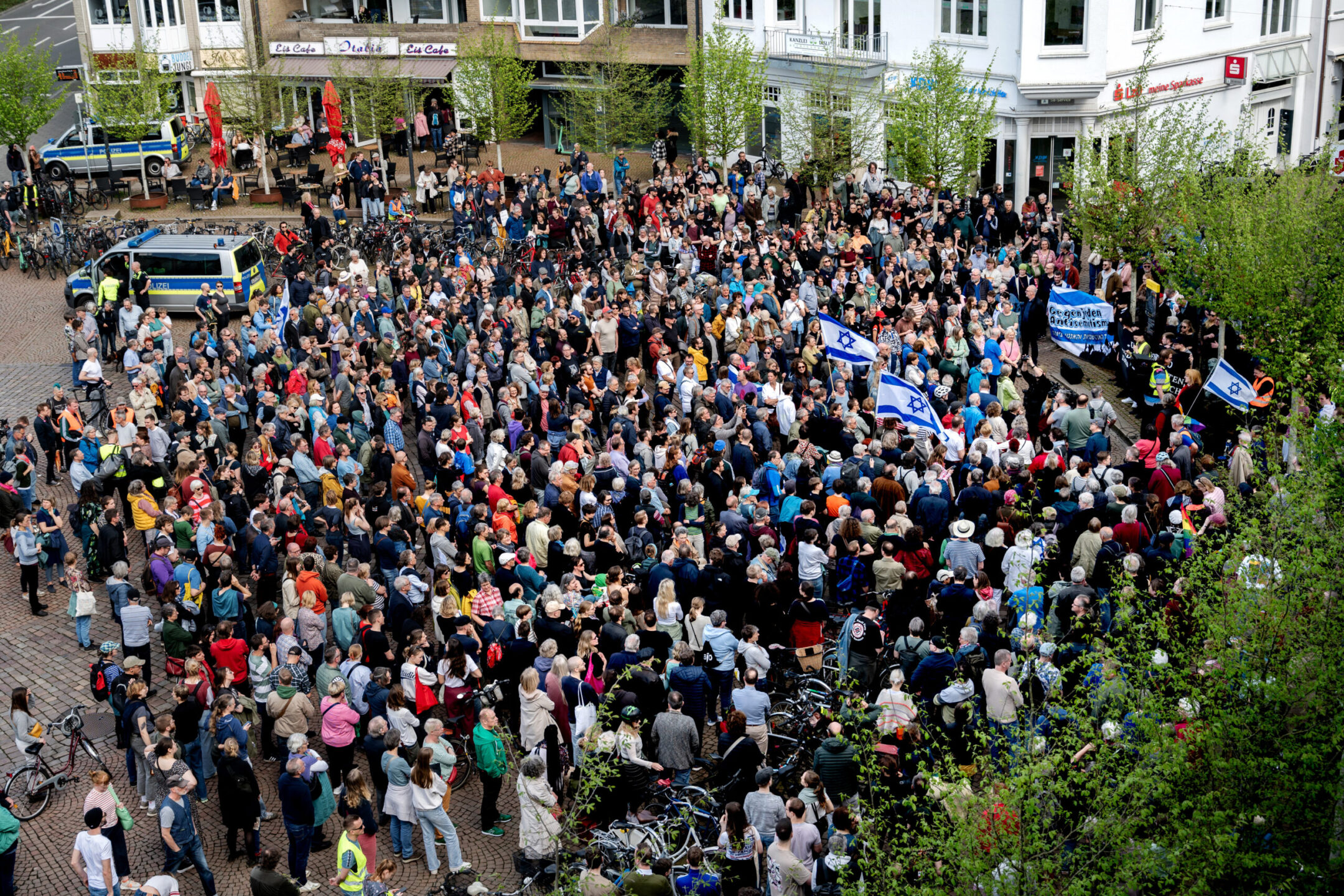(JTA) — Despite a wave of fear and pessimism about antisemitism in Europe, Jewish leaders intend to stay there, according to a new survey commissioned by a global Jewish aid organization.
Antisemitic incidents have surged in Europe since the Oct. 7 Hamas attack on Israel and Israel’s nine-month reprisals on Gaza, prompting some prominent Jewish voices to warn of mass emigration.
Menachem Margolin, who heads the European Jewish Association, had previously criticized Israeli leaders for exhorting European Jews to leave. He said in June that if Europe’s governments “carry on as they have so far, if they continue to tolerate this flood of Jew hate, they can expect hundreds and thousands of us to leave.”
But the majority of Jewish leaders and professionals in 32 countries say that while they are sharply concerned about the situation, they have no plans to leave Europe, according to the survey by the American Jewish Joint Distribution Committee, or JDC, released on Monday.
The survey of nearly 900 Jewish professionals, conducted six months after Oct. 7, marks the sixth in a series by the JDC since 2008. It found that Jewish leaders are no more likely to want to emigrate today than they were three years ago — 24% said they would consider leaving their countries because they did not feel safe as Jews, the same as in 2021. The proportion of leaders predicting Jewish emigration from their countries was also flat, at just under 50%.
“After the terrorist attacks in 2015, after COVID — after every crisis — we have heard this narrative depicting Europe as a spiritual wasteland or as a continent with no future for Jews,” Marcelo Dimentstein, who directed the study, told the Jewish Telegraphic Agency.
“Of course Oct. 7 is no exception, especially with the rise of extremisms and populism in Europe,” he added. “But at the same time, we have empirical data that shows that at least Jewish community leadership hasn’t been considering leaving Europe, that they are still considering their countries and their communities worth investing in.”
The JDC survey follows another report from the EU Agency for Fundamental Rights earlier this month, which found that 96% of Jews said they experienced antisemitism in the year before the study was conducted between January and June 2023. The agency also collected data from Jewish umbrella organizations that have recorded 400% increases in reported antisemitic incidents following Oct. 7.

Hundreds of people take part in a rally on Julius-Mosen-Platz in the city center of Oldenberg, Germany, to show their solidarity with the city’s Jewish community after an arson attack on the city’s synagogue, April 5, 2024. (Hauke-Christian Dittrich/picture alliance via Getty Images)
The Jews surveyed by JDC broadly reported greater feelings of fear, isolation and pessimism about the future after Oct. 7, with 79% saying that antisemitism is the leading threat to Jewish life in Europe. Most said they believed antisemitism would increase in the future.
Just 12% of respondents said they believed it was “very safe” to live and practice openly as a Jew in their own city, down from 36% in 2008.
But instead of fleeing Europe, Jewish leaders have responded to this sense of danger by strengthening relationships within their communities. More than half said they have grown closer with their Jewish friends, communities and families. At the same time, Jews are becoming more isolated from their broader environments — 38% said they are more distant from non-Jewish friends, while 27% reported feeling more distant from non-Jewish organizations that they are affiliated with. The survey paints a picture of European Jewish communities that are looking inward and strengthening internal bonds, even as they grow increasingly alienated from the societies where they live.
Ariel Muzicant, president of the European Jewish Congress, told JTA that most European Jews are dedicated to improving Jewish life in their home countries.
“They are proud European citizens and wish to live normal lives in the cities where their ancestors have lived for hundreds of years,” said Muzicant. “They believe that there is no future for Europe as a whole if antisemitism is allowed to thrive, as it is an affront to democracy and European values.”
For those who want to emigrate because of antisemitism, Israel is by far the preferred destination. Since Oct. 7, 22,000 people have immigrated to Israel, according to data from the Jewish Agency and Israel’s Aliya and Integration Ministry, although many began the process before the attack. French Jews showed a particular spike in interest, with 6,500 people opening case files to immigrate — a 500% increase from just over 1,000 people during the same period the previous year.

Rabbi Menachem Margolin of the European Jewish Association, Elon Musk and right-wing pundit Ben Shapiro stand on stage at an EJA conference in Krakow, Poland, Jan. 22, 2024. (Courtesy EJA)
European Jews describe a complex relationship with Israel that has fed their feelings of isolation. Most respondents told JDC that Israel is critical to Jewish life in Europe and that their commitment to Israel has strengthened since Oct. 7; the growth was particularly sharp among younger European Jewish leaders. But the proportion of Jewish leaders who said they are sometimes ashamed of the actions of the Israeli government also spiked from 39% in 2021 to 53% in 2024.
This sensitivity to events in Israel is tied to the reverberating effects they feel at home. More than nine in 10 Jewish leaders said that events in Israel sometimes lead to antisemitism in their country.
The survey showed a significant divergence between Jews in Eastern and Western Europe. Although fear about antisemitism increased in both regions, Westerners ranked it as the most serious threat to Jews, while Easterners ranked it only seventh on a list of concerns. Supporting Israel is a high priority in the West and a mid-level priority in the East. Easterners also feel increasingly optimistic about the future of European Jewry, while Westerners are becoming more pessimistic.
A century ago, Eastern Europe was considered the most dangerous region for Jews amid rampant pogroms and a lack of civic liberties, while Western Europe was seen as the land of emancipated Jews, said Dimentstein. But that trend has reversed since the second half of the 20th century, as Eastern European Jewish leaders have become more secular and their counterparts in the West have grown more fearful of extremist movements.
“Maybe it’s because of the more outspoken pro-Palestinian, anti-Israeli political movements, be they extreme-right or extreme-left, and the greater presence of radical Islam in those countries,” said Dimentstein.
The divide may be coming at a cost, the survey suggests. Western European leaders were more likely than Eastern European leaders to view a lack of religious pluralism as a serious threat, but they were also less likely to prioritize activities for non-observant Jews. “This apparent discrepancy may simply underscore the Westerners’ more intense prioritization of responding to external threats,” the report concludes.
In Ireland, Chief Rabbi Yoni Wieder said mounting antisemitism as well as the government’s vocal criticism of Israel have made some Jews feel pressured to choose between their Jewish and Irish identities. Still, he said, that’s not enough to push them out of Ireland.
“While a lot of Jewish people here feel perhaps the highest amount of tension between their Jewish identity and their place in Irish society that they’ve ever felt in their lifetimes, for most people, that’s still not enough of an impetus to seriously think about moving,” said Wieder. “For the vast majority of people, their lives are embedded here, everything they know is here, they’ve lived here in some cases for five, six generations.”






